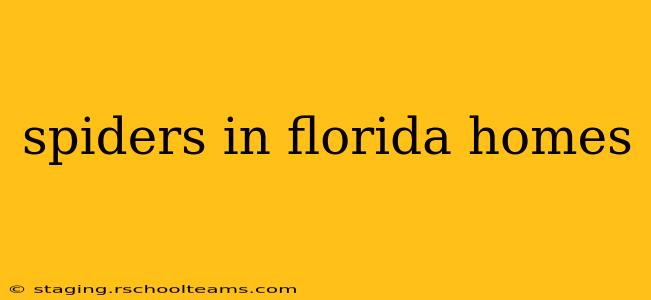Florida's warm, humid climate makes it a haven for a diverse array of spiders, many of which find their way into homes. Understanding the types of spiders you might encounter and how to manage their presence is crucial for both peace of mind and safety. This guide provides comprehensive information on common Florida house spiders, their identification, and effective control strategies.
Common Spiders Found in Florida Homes
Florida boasts a remarkable spider population. While most are harmless, some can deliver a painful bite. Let's explore some of the most frequently encountered species:
1. Brown Recluse ( Loxosceles reclusa)
While not as common in Florida as other states, the brown recluse is still found, particularly in northern and central regions. Identifying features: A distinctive violin-shaped marking on its cephalothorax (the fused head and chest region), six eyes arranged in pairs, and a light brown to dark brown body. Important Note: The brown recluse bite can cause necrotic lesions (tissue death) requiring medical attention.
2. Black Widow ( Latrodectus spp. )
Florida is home to several black widow species, identifiable by their shiny black bodies and the characteristic red hourglass marking (or variations thereof) on their abdomen. Identifying features: The red hourglass (which can sometimes be a series of red spots or stripes), a round, shiny black body, and long legs. Important Note: Black widow venom is neurotoxic and can cause severe pain, muscle cramps, and other systemic symptoms. Seek medical attention if bitten.
3. Wolf Spiders ( Lycosidae family )
These large, hairy spiders are often mistaken for tarantulas. They are active hunters, not web-builders. Identifying features: Large size (up to 1 inch), hairy bodies, and eight eyes arranged in three rows. Wolf spider bites are generally not dangerous to humans, causing only mild pain and localized swelling.
4. Orb Weavers ( Araneidae family )
Many types of orb weavers inhabit Florida homes. These spiders are easily recognized by their large, intricate webs, often found in corners, porches, or gardens. Identifying features: Variable in color and size, but most have round bodies and distinct patterns. Generally harmless, though a bite might cause mild discomfort.
5. Jumping Spiders ( Salticidae family )
Jumping spiders are small, agile spiders known for their excellent eyesight and hunting abilities. They don't build webs to catch prey but instead stalk and pounce on their victims. Identifying features: Small size, robust bodies, and excellent jumping capabilities. Their bites are generally harmless to humans.
Preventing Spiders in Your Florida Home
Proactive measures are the most effective way to minimize spider infestations:
- Seal cracks and crevices: Spiders often enter homes through small openings in walls, foundations, and windows. Caulk these gaps to prevent entry.
- Keep clutter to a minimum: Spiders love dark, cluttered areas. Regular cleaning and decluttering will eliminate their hiding spots.
- Remove webs regularly: Regularly sweeping and vacuuming webs discourages spiders from establishing themselves.
- Landscape management: Keep vegetation trimmed back from your house, reducing access points for spiders.
- Use natural repellents: Certain essential oils, like peppermint or tea tree oil, can deter spiders. However, their effectiveness is often limited.
Controlling Spider Populations
If preventative measures fail, several control options exist:
- Vacuuming: A simple and effective method for removing spiders and their webs.
- Sticky traps: These can be effective in catching spiders, but they may not eliminate the entire population.
- Professional pest control: For severe infestations or if you're dealing with potentially dangerous spiders like brown recluses or black widows, a professional pest control service is recommended.
Conclusion
Understanding the spiders that share your Florida home is the first step towards effective management. While many are harmless, knowing how to identify potentially dangerous species and taking proactive steps to prevent infestations ensures a safer and more comfortable living environment. Remember, if you're ever unsure about a spider's identification or if you've experienced a bite, seeking professional medical advice is always recommended.
